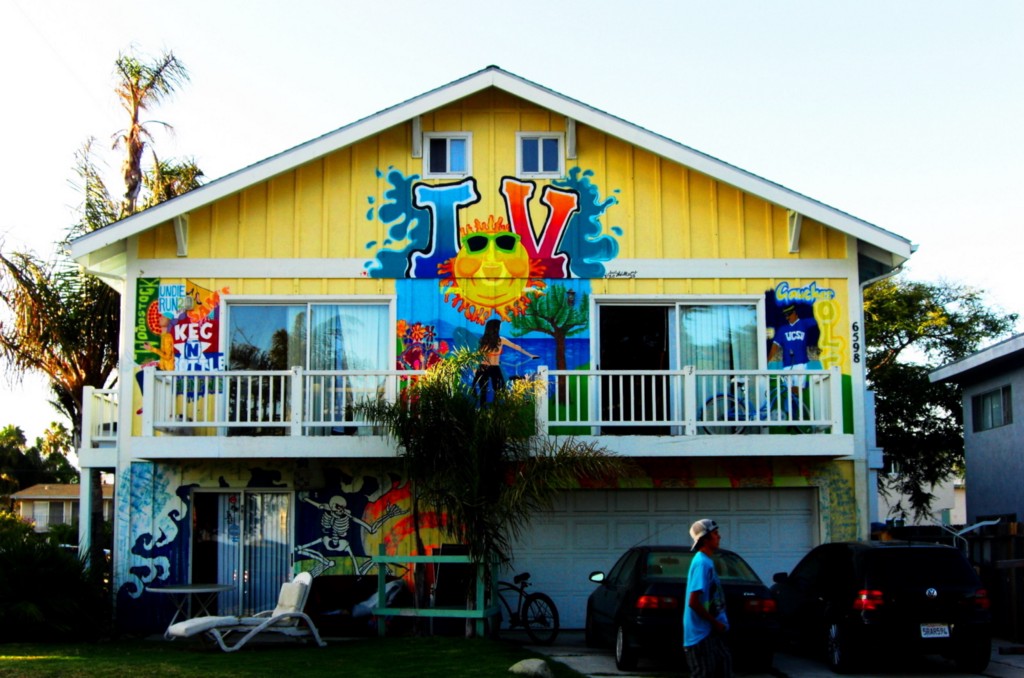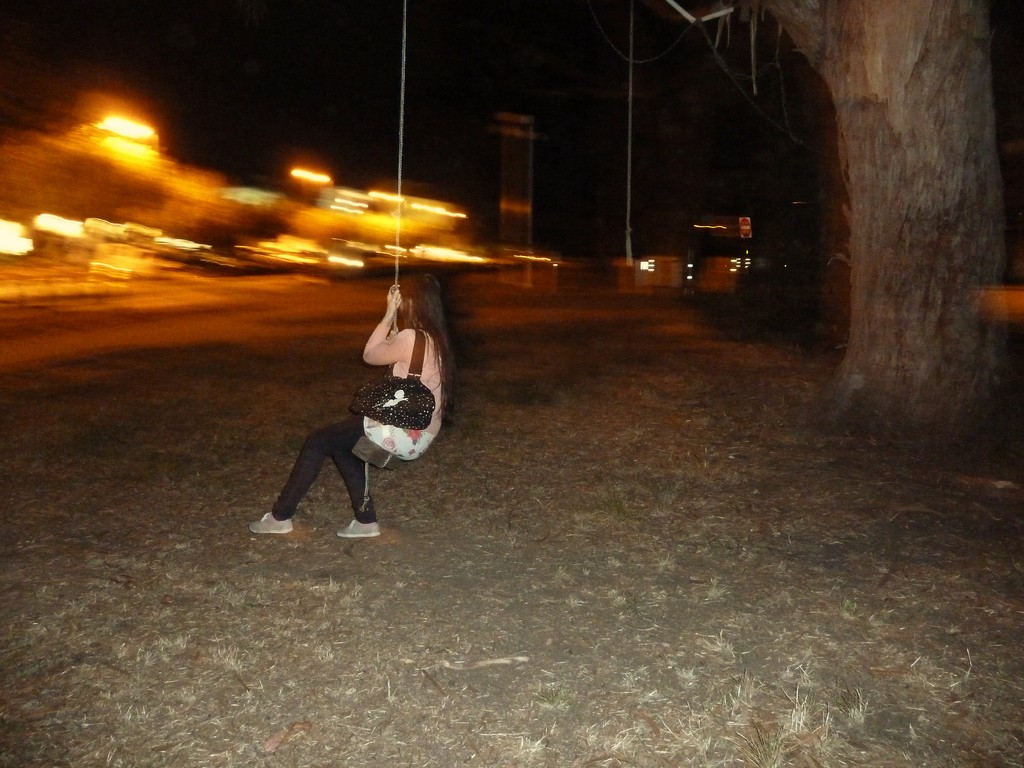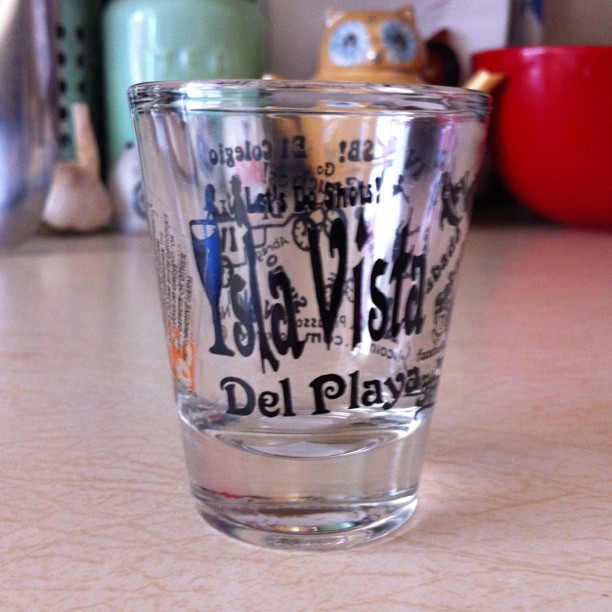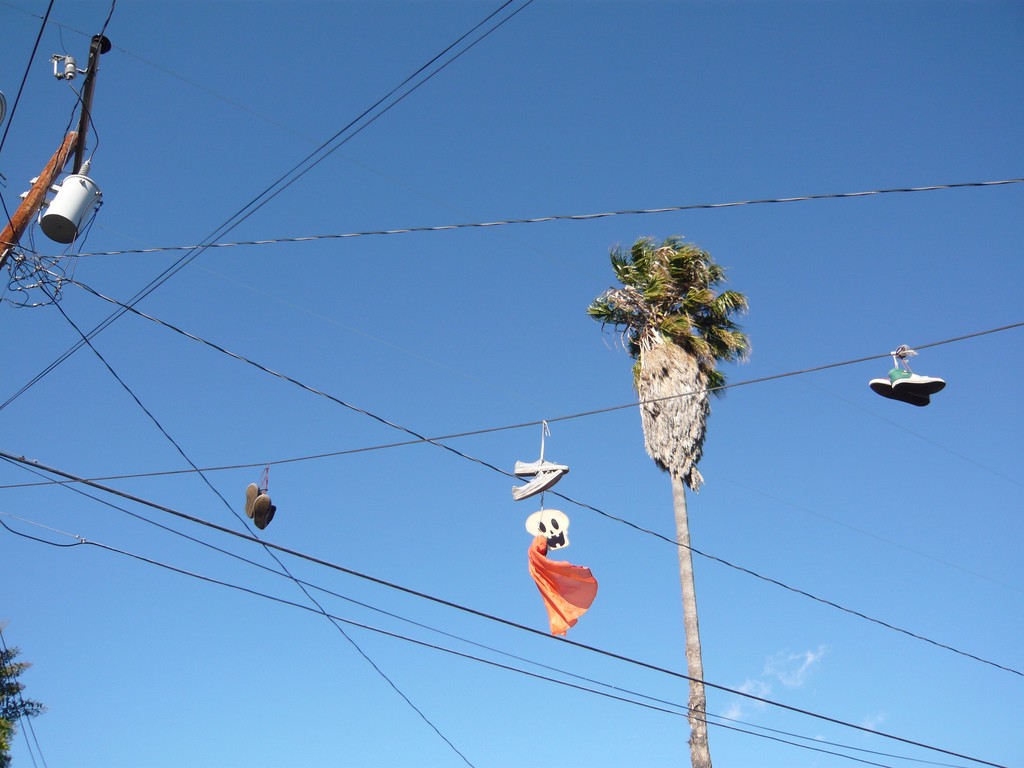You Need To Relax, Bro
Spring Break in Isla Vista

As the sun sets over the glittering Pacific Ocean, a girl in a fuchsia bathing suit tells me, “It’s pretty much always like this.”
The it she is refereeing to is Isla Vista, suburb of Santa Barbara, commonly thought of as a college town for UCSB. The this is a party, one of the largest I’ve seen outside of reality TV shows. The soundscape is provided by various portable speakers that get kicked around amongst the dancers who are mostly are college students, some curious locals. The party’s theme is ambiguous, as is the number of cultures it pays homage to — some people wear leis and tribal makeup, some bindis, some drape kimonos over their bathing suits and drink out of halved coconuts. They have tiki torches and small fireworks. They carry surfboards and boogie boards and long boards and skateboards and skateboards shaped like surfboards, and men pull dogs on skateboards shaped like surfboards.
There is swimming and limbo. Scantily clad bodies gyrate and tumble over one another in hot pursuit of a volleyball. A few faces in the crowd look familiar. I’ve met them. I’ve crashed in their beds and regretted standing barefoot in their bathrooms. I’ve heard them try to order tacos at IHOP. I have watched them drinking cheap vodka out of an inflatable swimming pool. In the water, fluorescent bikinis and board shorts and visors move like schools of large tropical fish. Later, they come together to make a fire. There is no sense of ephemerality to their partying, only time, ongoing like the winding coast.

Fuchsia bathing suit says a lot of people come this time of year. Kids who go to school in colder regions come for spring break. All who visit Isla Vista, for one reason or another, feel a need for spontaneity. Perhaps they, like me, felt too comfortable in a routine of school and work and want to prove their gall and youthful durability by wearing scandalous maritime garb and sleeping on questionable mattresses.
The town has exactly what they are looking for — mindless fun, if you consider this kind of thing fun, that is. Disaster lurks in every beer bong. The ocean is perilous, with jutting rocks that could skewer and shred these tender partiers like wet paper. Walking on the sand, one could get a fragment of shattered glass lodged in their foot or prick a finger upon picking up a razor blade they mistook for a shell glinting in the sun. Then, of course, there is the fatal amount of alcohol these bouncing bodies consume nightly. With the mixture of ecstasy and sun exposure and E. coli from the local Taqueria, it is a wonder there is anybody left to return to class. Not to mention the parasailing. Needless to say, spring break is a death trap.
My car broke down upon arriving in Isla Vista. There is a notable lack of mechanics for a hundred miles in all directions as if on purpose, blurring the line between partier and hostage. A group of girls and I checked into an Airbnb and soon missed our home’s modest amenities as though they were those of a five-star hotel. The room we stayed in was a converted garage that was sparsely furnished: a rug, a shelf, a book of astrology, and one twin-sized bed. A layer of sand coated all surfaces in the house. Our hosts were six boys who attended the nearby college and one girl whose name escapes me but whom, for the duration of the trip, we called Shelly. Upon our arrival, around 11 a.m., Shelly promptly offered us a round of shots and a bong rip like a cruise might offer its guests a free continental breakfast.

Our hosts kept alcohol like some might stock canned foods for the apocalypse. Bottles filled the cabinets: whiskey, rum, gin; half full, a third full, some only with the sticky brown residue left at the bottom. Cans of PBR, Budweiser, forty ounces, tallboys, piles of the plastic six-pack circles that penguins get stuck in. Canned margaritas, daiquiris, piña coladas, and squirt guns filled with Smirnoff. Sprite, soda, Red Bull, coffee, no filters. There were many glass contraptions to smoke out of and many boxes that once held pizzas. There was a Twister mat on the floor being used as a rug. The dartboard had kitchen knives jutting out of it. The darts were being used to pin up an Eric Clapton poster.
Wanting to spend as little time in Shelly’s house as possible, we set out toward the beach, which was within walking distance. Sand became a part of things. It was in our clothes and our beds and our sandwiches. It went unnoticed after a while. On the beach were people who, like Shelly and her housemates, had an affinity for drinking and doing dangerous things. They cannonballed off rocks and dragged their squealing female companions into the foamy surf after them. Yet nobody seemed to recount any tragedies. “I’m a senior and it’s been smooth sailing,” explained a guy on the beach who wore his towel like a cape. “Except that thing with Benji, but he just can’t eat soybeans anymore.”
The people of Isla Vista don’t fear things. They are happy being ignorant of alcohol poisoning and seaweed nooses. The only worry I sensed from our beach company was about an impending econ final that nobody seemed prepared for, or proactive about becoming so. I found myself envious of their serenity. A bumper sticker on a local’s van that read, “You need to relax, bro,” became the mantra of the trip.

The town had an anachronistic feel in that information was spread not through cell phones but people screaming information in the town center. This is how we were tipped off about the beach party where I wound up talking to the girl in the fuchsia bathing suit. She remained in only her suit for the rest of the night. It did not get cold. Many people didn’t even feel the need to take off their sunglasses. The girl excused herself from my questioning, explaining that this party, more packed with people than Times Square at New Year’s Eve, was dying out and she had to flock elsewhere.
Along the bluff was a grain field with a picnic table in the tall grass. You could watch the sun set from the table and the tide swallow the beach below. People were draped over the table and lying in the comfort of the surrounding ice plants. Some were watching a girl dance with a hula-hoop in lieu of a partner while others watched the sky. There was no light pollution. A friend noted how she never gets a minute to just appreciate the stars. In Los Angeles, where we had come from, you’d be lucky to see an airplane through the smog. Here, the cosmos was a vast governing force blanketing the sandy village. A few people lifted their sunglasses.
At one point that night, I ended up in my car with no intention of driving. It smelled familiar, as if all the comforts of home could be found in the upholstery. Outside, the little beach houses lit up and locals biked and skated through the puka-shell-string doorways. The dwellings were tacked up clumsily, certainly unable to withstand the natural disasters that came with living on a fault line. It wasn’t that there was no sense of danger, but no sense of a future. This place survived day by day. With just a few adjustments to my muffler, I could be back in a world of structure and opaque clothing, but not Shelly and towel-cape-guy. They would stay here. Their minute of appreciating the stars had extended to years. This wasn’t a just bizarre vacation; they would never repair their houses, get the sand out of their hair, or pass econ. The town kept everyone in a purgatorial state and all I could do was watch through the windows of my Hyundai.

Shelly and her housemates were right where I had left them, throwing knives at the dartboard. The room was cluttered with our suitcases packed for three days. We only stayed the one. A few of the girls who’d come with me were strewn around the room, their complexion unnaturally pale for all the time they’d spent in the sun. A girl sat up from where she had been sleeping on an air mattress. There were a few flustered moments as she took in her surroundings before she leaned over and threw up into my backpack, which sat open and welcoming by the bed. She inspired another girl to spew across the coffee table, her stomach acid covering some tarot cards and a packet of Hostess cupcakes, and once more on the uncarpeted floor. This resulted in many three-stooges-style slips as various people ran in to be of assistance. The house did not have a mop.
I followed one girl who careened toward the bathroom and flopped over the toilet. This is how I first came into contact with Shelly’s bathroom. The tile was caked in dry toothpaste and shampoo buildup (which is to be expected in a small house with so many tenants) and that was crusted over with a sort of mildew film. But what couldn’t be explained was the black residue in every crack and corner. It was thick and looked to be the texture of oatmeal. Rogue hairs from shaving and trimming stuck to the black fungus, resembling the body of a furry caterpillar. Crouched on this floor and leaning over the vomit-filled bathtub, the girl turned to me with a look I will never forget. Her hair was mangled and her eyes were all pupil, as black and empty as the L.A. sky. It was a look rarely seen outside of horror-movie victims before they are stabbed to death. I heard the bumper sticker taunt, “You need to relax, bro,” as she curled up into a ball.
The next morning, we got the car fixed. The group didn’t have much money and even less knowledge of car maintenance but a wonderful man named Bruce mended it for free. He had a paternal quality. It was evident from everyone’s faces that his help was imperative. It was not just our expressions but our appearances — we each ended the trip intensely sunburned, skin peeling down our noses and backs as a scalding reminder never to leave our comfort zones. Bruce waved the car off, which I drove in silence, I imagine like an army plane back from war, its passengers traumatized but connected by an unspoken bond. It didn’t break, except briefly in an IHOP parking lot so everyone could call their moms.
